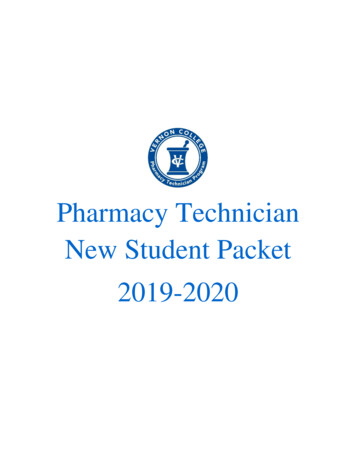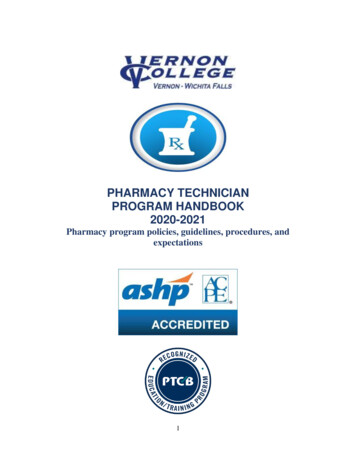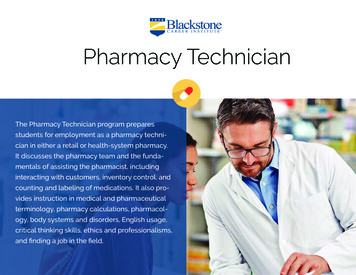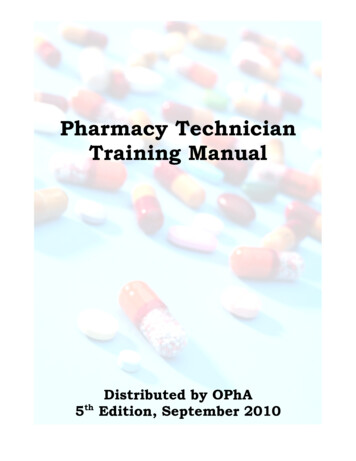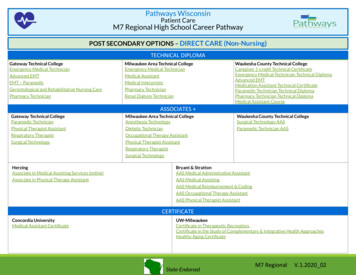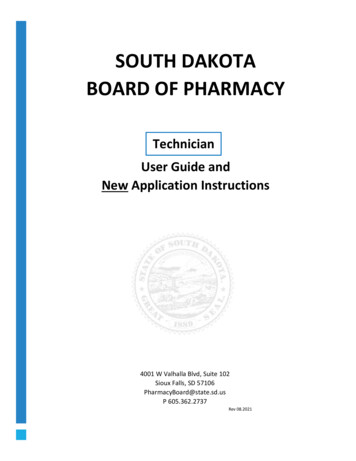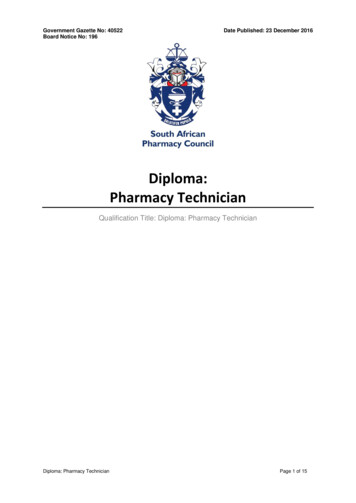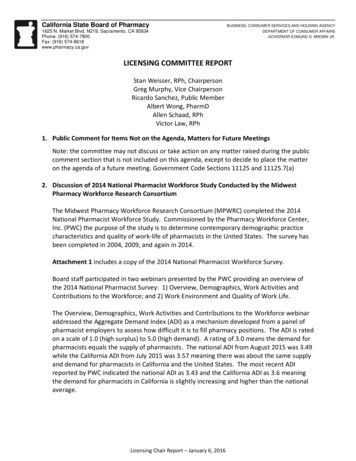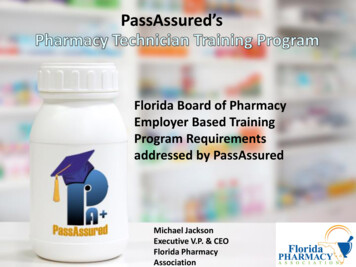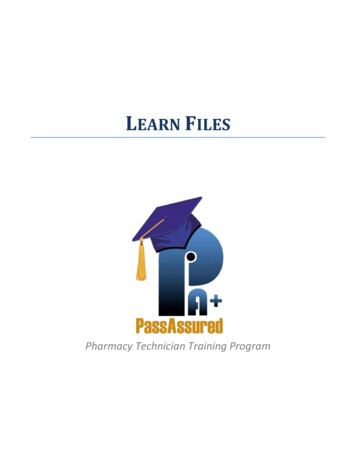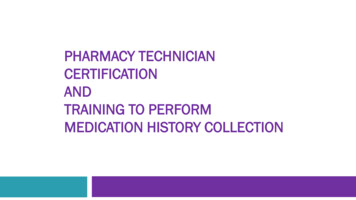
Transcription
PHARMACY TECHNICIANCERTIFICATIONANDTRAINING TO PERFORMMEDICATION HISTORY COLLECTION
ObjectivesAt the conclusion of this activity,Pharmacists will be able to:List topics pharmacy technicians should be trained in to perform medication historycollection Evaluate pharmacy technician competency in collecting medication history Identify the advanced credentials available to pharmacy technicians and understand thetraining required to obtain them. Pharmacy technicians will be able to:Identify barriers to collecting a best possible medication history Describe how to collect a best possible medication history Listthe steps to becoming an Advanced Certified Pharmacy Technician (CPhT-Adv).
BACKGROUND
Medication reconciliationcommittee Goal of improving discharge medication reconciliationUpon review, many discharge discrepancies caused by inaccurate informationentered on admission Plan to improve admission medication history collectionLiterature search has shown that pharmacy staff collect more accuratemedication histories Trainedpharmacy technicians perform as well as pharmacistsJohnston, 2010
Health Workforce RetrainingInitiative Grant GoalsPharmacy technician certification for uncertified technicians Medication history collection training HiredPharmacist trainer Technician backfill PurchasedEquipment (workstation on wheels) Reference books Study materials Payment for test
Exclusions Some pharmacy technicians were excluded from medication historycollection training (supervisor decision) Languagebarrier Specialized job function Personality
Medication History CollectionTrainingPreparationPatient InterviewEmergency Department Layout/Finding PatientsComputer System Training-separate pharmacy and EMR systemsDidactic Classes on Dosage Forms and NonformularyProductsReview follow up questions
Preparation Review patient profile Alertand oriented? Arrived to ED alone or with someone? HIPAA Review outpatient informationPrevious collection done by nurse or providerReview transfer sheets if arriving from outside facility
Patient interview Technicians may not be familiar with patient interview process Simulation during trainingGreetingOpen ended questionsBPMH Check list
Greeting IntroductionTechnician name Title PurposeCollect medication list Ask questions about medications Is now a good time? Especially if someone is with the patientDouble identifierPatient name Date of birth
Examples of open endedquestions Who takes care of your medications at home?What medications are you taking?What dose, strength, frequency?What do you take this medication for?When is the last time you took this medication? How do you take this medication?
Non-oral medicationsEyedropsNasal ectionsSuppositories
BPMH topics/medication-reconciliation/
Assessment questionWhich of the following is a correct step to take when collecting aBPMH?A. Use open ended questionsB. Use at least 2 sources of informationC. Ask about non-oral, non-daily, and non-prescription medicationsD. Return to the patient to clarify and resolve discrepanciesE. All of the above
Assessment questionWhich of the following is a correct step to take when collecting aBPMH?A. Use open ended questionsB. Use at least 2 sources of informationC. Ask about non-oral, non-daily, and non-prescription medicationsD. Return to the patient to clarify and resolve discrepanciesE. All of the above
Examples of barriers tocollecting a BPMH LanguageDementia/Altered mental statusIllnessPatient unfamiliar with medications Patient upset/refusing History already collected by other staffPatient not available Patient does not have a medication listTransferTestsSeen by other staffComputer systems do not communicateOutpatient providers have inaccurate listsLack of timeJohnson, 2015BPMH
Assessment questionWhich of the following is NOT a barrier to collecting a BPMH?A. Lack of timeB. Cost of medicationsC. DementiaD. Computer system do not communicateE. Outpatient providers have inaccurate lists
Assessment questionWhich of the following is NOT a barrier to collecting a BPMH?A. Lack of timeB. Cost of medicationsC. DementiaD. Computer system do not communicateE. Outpatient providers have inaccurate lists
Emergency departmentorientation General layout Waitingroom/triage Beds Stretchers Chairs Isolation roomsPharmacy area/work spaceContact precautionsHand hygiene
Computer system training NavigationED tracking board/patient listOutpatient informationOutpatient pharmacy/provider contact information Call pharmacy or doctor’s office for more informationMedication history documentationUpdate default pharmacyTips and tricks Duoneb ipratropium/albuterol
Medication education Nonformulary/outpatient medications Inhalers Insulins Noninsulininjectables Oral diabetic medications Combination products Dosage forms (extended/immediate release)
Examples of follow upquestions Rescue inhalers if on maintenance inhalersVitamin D if on calciumNot taking medication: prescriber aware or stopped by selfIndication for as needed medicationTopical medication application siteDate started/day of therapy for short term medications Antibiotics Steroid taperSpecific location of pharmacy (town/street)
Hands on in the emergencyroom Pharmacist hired by grantBackfill technicians while training technician was in the EDA week with pharmacist supervisionCompetency review at the end of the week
Competency Form
Assessment Question25Which of the following is NOT a topic pharmacy technicians shouldbe trained in to work in the emergency department and collectmedication history?A. Emergency department layoutB. Patient interview process/BPMHC. PharmacokineticsD. Outpatient medicationsE. Computer system
Assessment Question26Which of the following is NOT a topic pharmacy technicians shouldbe trained in to work in the emergency department and collectmedication history?A. Emergency department layoutB. Patient interview process/BPMHC. PharmacokineticsD. Outpatient medicationsE. Computer system
References Johnston R, Saulnier L, Gould O. Best possible medication history in theemergency department: comparing pharmacy technicians and pharmacists.Can J Hosp Pharm. 2010 Sep;63(5):359-65.Johnson A, Gulrguls E, Grace Y. Preventing medication errors in transitions ofcare: A patient case approach. J Am Pharm Assoc. 2015 Mar-Apr;55(2):e264-74.“Medication Reconciliation: Clinical Topics.” Medication Reconciliation ClinicalTopics Society of Hospital Medicine, -reconciliation.
Pharmacy TechnicianCredentialsRyan Burke, PharmDDirector, Professional AffairsPharmacy Technician Certification BoardNew York State Council of Health-System PharmacistsNovember 5, 2019
DisclosuresRyan Burke is employed by the Pharmacy TechnicianCertification Board. He declares no other conflicts ofinterest, real or apparent, and no other financial interestsin any company, product, or service mentioned in thisprogram, including grants, employment, gifts, stockholdings, and honoraria.
Learning ObjectivesPharmacistsIdentify the advanced credentials available to pharmacytechnicians and understand the training required toobtain them.Pharmacy TechniciansList the steps to becoming an Advanced CertifiedPharmacy Technician (CPhT-Adv).
Mission and VisionMission: PTCB advances medication safetyby credentialing technicians who arequalified to support pharmacists andpatient care teams in all practice settings.Vision: PTCB sets the standard forcredentialing of technicians that improvesmedication safety and patient care.
Recent & UpcomingChanges
Education/Training RequirementCPhT EligibilityPathwaysCompletion of t workexperience (i.e., 500hours)Required knowledge is the same for both paths.
Future CPhT Changes:PTCE 3.0PTCE will contain only the most important contentrelevant to both major areas of practice.TJCHealth ling
Assessment-BasedCertificate Programs &Advanced Credentials
Assessment-Based Certificate ProgramsTechnician Product Verification (Tech-Check-Tech)Medication HistoryHazardous Drug ManagementBilling and ReimbursementControlled Substance Diversion PreventionEligibility Criteria: Be an active PTCB CPhT and complete a PTCB-recognizededucation/training program. Some programs will also include an alternativeeligibility pathway.
Medication HistoryCertificate Program
Scope of the ProgramPTCB Medication History certificate holders have demonstrated thenecessary training, experience, and knowledge to be entrusted to collect anaccurate medication history from patients in any health-care setting.
Medication History ProgramEligibilityPathwaysCompletion of aPTCB-recognizedprogram 6 monthsof experience*One year ofexperience**Approximately 50% of time spent in work activities should involve patient-focused communication (e.g., intake of newpatients/prescriptions, answering patient questions). The intention of the requirement is that pharmacy technicians with fulltime work experience in community pharmacies and/or work experience in ambulatory/hospital roles focused on takingmedication histories will meet the spirit of the requirement.
Medication History Exam Content OutlineConcepts/Terminology of Medication History (45%)Definitions of key terms in the medication history process (e.g.,medication allergy vs. medication intolerance, medication adherence)Translation between patient-friendly terms and medical terminologyAdherence metrics and differences between primary and secondarynonadherenceCommon vaccinations and vaccination schedules
Medication History Exam Content OutlinePatient Safety & Quality Assurance Strategies (55%)Types of prescription/medication errors (e.g., abnormal doses, incorrect quantity, incorrect strength, incorrect drug, incorrectroute of administration, incorrect directions, wrong timing, missing dose, misinterpretation of drug concentration)Potential impact of medication errors, including look-alike/sound-alike medications (e.g., ampicillin/amoxicillin)Patient factors that influence the ability to report medication information accurately and adhere to prescribed dosingschedulesHIPAA and best practices to maintain patient confidentiality during patient conversationsTechniques or devices to assist with safe and consistent home medication use (e.g., pill boxes, medication calendars,medication alarms)Procedures to verify patient identity, including appropriate identifiers and knowledge of limitations for different identifiers
Medication History ExamComputer-based exam with 79 multiple-choicequestions2 hours (10-minute tutorial and survey, 1 hour and 50minute exam)A note about scoring: Because the Medication History Assessment-Based CertificateProgram is new, scoring will be delayed by 3-4 months. PTCB will apply the same rigorousprocess to determine the passing score for the Medication History Exam after multiplecandidates have tested.
Digital Badges
Advanced Certified Pharmacy TechnicianBe an active PTCBCPhT Successfullycomplete at least 4certificate programs* Have at least 3 yearsof work experience inthe last 8 years*One must be either TPV orMedication HistoryIndividuals who earn the CPhT-Adv credential will be required to earnadditional CE hours to maintain their certification.
Self-Assessment QuestionWhich topic will not be included in the initial release ofPTCB’s Assessment-Based Certificate Programs?A. Technician Product VerificationB. Medication HistoryC. Immunization DeliveryD. Controlled Substance Diversion PreventionE. Hazardous Drug Management
Self-Assessment QuestionWhich topic will not be included in the initial release ofPTCB’s Assessment-Based Certificate Programs?A. Technician Product VerificationB. Medication HistoryC. Immunization DeliveryD. Controlled Substance Diversion PreventionE. Hazardous Drug Management
Self-Assessment QuestionHow many years of work experience must a certifiedpharmacy technician have in order to be eligible to earn theAdvanced Certified Pharmacy Technician Credential (CPhTAdv)?A. 2 yearsB. 3 yearsC. 4 yearsD. 5 yearsE. 6 years
Self-Assessment QuestionHow many years of work experience must a certifiedpharmacy technician have in order to be eligible to earn theAdvanced Certified Pharmacy Technician Credential (CPhTAdv)?A. 2 yearsB. 3 yearsC. 4 yearsD. 5 yearsE. 6 years
Thank you!Questions?Mark Shen, PharmD.,BCPSNYU Winthrop HospitalT: 516-663-1619E: Mark.shen@nyulangone.orgRyan Burke, PharmDPharmacy Technician Certification BoardT: 202-888-1727E: rburke@ptcb.org
List topics pharmacy technicians should be trained in to perform medication history collection Evaluate pharmacy technician competency in collecting medication history Identify the advanced credentials available to pharmacy technicians and understand the training required to obtain the
